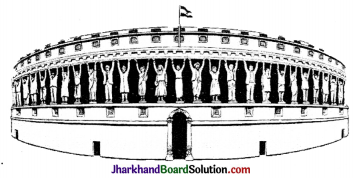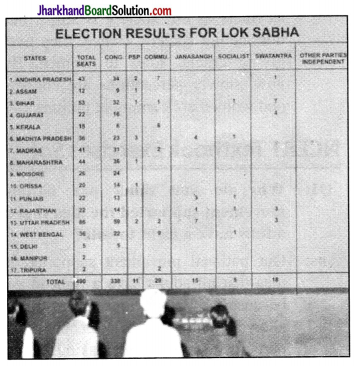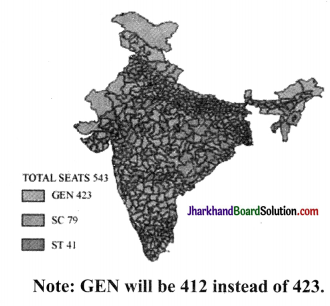JAC Board Class 8th Social Science Solutions Civics Chapter 3 Why Do We Need A Parliament?
JAC Class 8th Civics Why Do We Need A Parliament? InText Questions and Answers

Question 1:
What do you think the artist is trying to convey through the image of Parliament?
Answer:
The artist is trying to convey through the image of Parliament is that it is based on people’s strength and power. These people come from various background and shows unity is strength.
Page 32
Question 2.
Give one reason why you think there should be universal adult franchise.
Answer:
There should be universal adult franchise because it will help to establish equality in the society.
![]()
Question 3.
Do you think there would be any difference if the class monitor was selected by the teacher or elected by the students? Discuss.
Answer:
Yes, there would be a difference if the class monitor was selected by the teacher or elected by the students. If the
class monitor is chosen by the teacher then it will not be a democratic process. But, if the students of the class elect the monitor then he will be representative of the class and this shows a democratic process.
Page 35
Question 4.
Use the table to answer the questions below: Results of the 16th Lok Sabha Elections, (May 2014) Political Party No. of MPs National Parties
- Bharatiya Janata Party (BJP) 282
- Communist Party of India (CPI) 1
- Communist Party of India (Marxist) (CPM) 9
- Indian National Congress (INC) 44
- Nationalist Congress Party (NCP) 6
- State Parties (Regional Parties)
- Aam Aadmi Party (AAP) 4
- All India Anna Dravida Munnetra Kazhagam 37
- All India Trinamool Congress 34
- All India United Democratic Front 3
- Biju Janata Dal (BJD) 20
- Indian National Lok Dal (INLD) 2
- Indian Union Muslim League (IUML) 2
- Jammu and Kashmir Peoples Democratic Party 3
- Janata Dal (Secular) 2
- Janata Dal (United) 2
- Jharkhand Mukti Morcha (JMM) 2
- Lok Jan Shakti Party 6
- Rashtriya Janata Dal (RJD) 4
- Samajwadi Party (SP) 5
- Who will be present for discussions in the Lok
- Shiromani Akali Dal 4
- Shiv Sena 18
- Telangana Rashtra Samithi (TRS) 11
- Telugu Desam (TDP) 16
- Other Regional Parties 7
- Registered Unrecognised Parties 16
- Independents 3
Grand Total 543
- Who will form the government? Why? Sabha?
- Is this process similar to what you have read about in Class VII?
Answer:
- BJP will form the government because they have the majority.
- The MPs will be present for discussions in the Lok Sabha.
- Yes, this process similar.
![]()
Question 4.
The photograph on page 28 shows results from the 3rd Lok Sabha elections held in 1962.

Use the photograph to answer the following questions:
(a) Which state has the highest number of MPs in the Lok Sabha? Why do you think this is so?
(b) Which state has the least number of MPs in the Lok Sabha?
(c) Which political party has won the most seats in all states?
(d) Which party do you think will form the government? Give reasons why.
Answer:
(a) Uttar Pradesh. This state has the largest population as compared to other states.
(b) Manipur.
(c) The Congress Party
(d) The Congress Party will form the government because they have won in majority.
Page 38
Question 5.
Lok Sabha Unstarred Question uestion No: 48 Answered On: 15.12.2017 Converge of Schemes for Children Manoj Rajoria Will the Minister of Women and Child Development be pleased to state:
(a) whether the Government proposes to converge various schemes and policies for children in the country;
(b) if so, the details thereof; and;
(c) if not, the reasons therefor?
Answer:
Minister of State in the Ministry of Women and Child Development (Dr. Virendra Kumar). (a) to (c) The Ministry has developed the National Plan of Action for Children 2016 which largely draws upon the existing programmes and schemes of various Ministries/Departments.
It provides a framework for convergence and co-ordination between Ministries/Departments and State/ UTs Governments and encourages collective action from all stakeholders to address multi dimensional vulnerabilities experienced by children. The National Plan of Action for Children 2016 categorizes children’s rights under four key priority areas.
(i) Survival, Health and Nutrition,
(ii) Education and Development,
(iii) Protection and
(iv) Participation. It identifies key programmes, schemes and policies as well as stakeholders for the implementation of different strategies. In the above question, what information is being sought information from the Minister of Women and Child Development? If you were a Member of Parliament (MP), list two questions that you would like to ask.
Answer:
The information which is being sought from the Minister of Women and Child Development were:
- whether the Government proposes to converge various schemes and policies for children in the country;
- if so, the details thereof; and;
- if not, the reasons therefore.
If I were a MP, then I would have asked the following questions:
- What is the government doing for women to bring at the level of men?
- What is the government doing to give education to every child?
Page 39
| Lok Sabha | Election Years | Voter Turnout (%) |
| 1st | 1951-52 | 61.16 |
| 4th | 1967 | 61.33 |
| 5th | 1971 | 55.29 |
| 6th | 1977 | 60.49 |
| 8th | 1984-85 | 64.01 |
| 10th | 1991-92 | 55.88 |
| 14th | 2004 | 57.98 |
| 15th | 2009 | 58.19 |
Looking at this table would you say that people’s participation during the past 65 years has: decreased/increased/been stable after initial increase?
Answer:
After initial increase, it decreased and then increased again. It has been fluctuating.
Page 40
Question 7.
Why do you think there are so few women in Parliament? Discuss.
Answer:
People don’t want to accept women as rulers as our society is still a male dominating society. Hence, they avoid giving crucial roles to women. But, now, slowly perceptions are changing and women are coming in politics
JAC Class 8th Civics Why Do We Need A Parliament? Textbook Questions and Answers
Question 1.
Why do you think our national movement supported the idea that all adults have a right to vote?
Answer:
Our national movement supported the idea that all adults have a right to vote because the British government did not allow all adults to vote nor could people participate in decision making. Hence, in the struggle for independence people from all walks of life participated. They came from various backgrounds and were united in their aspirations for a free, equal and independent nation where decision-making would be in the hands of the people. The only way in which this would be possible through elections which will allow common people to have consent to and approve of a government that they have a right to choose.
![]()
Question 2.
In this 2004 map of Parliamentary constituencies alongside, roughly identify the constituencies in your State. What is the name of the MP from your constituency? How many MPs does your state have? Why are certain constituencies coloured green while others are coloured blue?

Answer:
- Students need to do it on their own.
- Certain constituencies are coloured green while others are coloured blue because they are reserved constituencies for SC and ST respectively.
Question 3.
You have read in Chapter 1 that the ‘Parliamentary form of government’ that exists in India has three tiers. This includes the Parliament (centra! government) and the various Sta Legislatures (state governments). Fill in the following table with information on the various representatives from your area:
| Objective | State Government | CentralGovernment |
| Which political party/parties is/ are currently in power? | ||
| Who (name) is the current representative from your area? | ||
| Which political parties currently form the Opposition? | ||
| When were elections last held? | ||
| When will the next elections be held? | ||
| How many women representatives are there (from Question ‘our state)? |
Answer:
Students need to do it on their own with the help of teacher.
JAC Class 8th Civics The Why Do We Need A Parliament? Important Questions and Answers
Multiple Choice Questions
Question 1.
In democratic India, people elect their representatives to the Parliament, then, one group from among elected representatives forms the government. How long members are elected for?
(a) Five years
(b) Eight years
(c) Seven years
(d) Ten years
Answer:
(a) Five years
Question 2.
In which year Indian Parliament came to existence?
(a) 1952
(b) 1949
(c) 1950
(d) 1947
Answer:
(d) 1947
Question 3.
The election for Lok Sabha is usually occur once every five years. The elected candidates are known as
(a) Ministers of State
(b) Members of Parliament
(c) Members of Constitution
(d) None of these
Answer:
(b) Members of Parliament
Question 4.
Which of the following function/s the Parliament needs to perform?
(a) To make law
(b) To select the national government
(c) To control, guide and inform the government
(d) All of these
Answer:
(d) All of these
Question 5.
It may happen that one political party does not get a clear majority in election. In such a situation a group of parties come together to form a government. This type of government known as a……..
(a) coalition government
(b) admission government
(c) commission government
(d) opposition government
Answer:
(a) coalition government
![]()
Question 6.
……. functions primarily as the representative of the states of India in the Parliament.
(a)The Prime Minister
(b) The Judiciary
(c) The Rajya Sabha
(d) The President
Answer:
(c) The Rajya Sabha
Question 7.
Who is the leader of the ruling party in the Lok Sabha?
(a) The President
(b) The Vice President
(c) The Prime Minister
(d) The Chief Minister
Answer:
(c) The Prime Minister
Question 8.
There are elected members plus members nominated by the President.
(a) 233; 12
(b) 133; 15
(c) 233; 15
(d) 123; 20
Answer:
(a) 233; 12
Question 9.
The Parliament keeps a heck on the ministers and their work. MPs have the right to question the ministers about the working of their department. This is usually done during .
(a) the answering hour
(b) the question hour
(c) the listening hour
(d) the analysis hour
Answer:
(b) the question hour
Question 10.
The seats are reserved in Parliament for…….
(a) the people from the army
(b) the royal family members
(c) SCs and STs
(d) both a and c
Answer:
(c) SCs and STs
Very Short Answer Type Questions
Question 1.
What do you mean by EVM?
Answer:
EVM means Electronic Voting Machine.
Question 2:
When were EVMs used for the first time?
Answer:
EVMs were used throughout the country for the first time in the 2004 general elections.
Question 3.
Name the two Houses of Parliament.
Answer:
The two houses of Parliament are the Rajya Sabha and the Lok Sabha.
Question 4.
How does the Parliament session begins?
Answer:
The Parliament, session begins with a question hour.
Question 5.
What do you mean by constituency?
Answer:
Constituency is an area whose voters elect a representative to a legislative body.
![]()
Question 6.
What is the main purpose of parliament?
Answer:
Parliament enables citizens of India to participate in decision making and control the government.
Question 7.
Who presides over Lok Sabha?
Answer:
Lok Sabha (House of the People), with a total membership of 545, is presided over by the Speaker.
Question 8.
How many members does the President nominates in Lok Sabha and Rajya Sabha?
Answer:
The President nominates 2 members to the Lok Sabha and 12 members to the Rajya Sabha.
Question 9.
What is the principle of universal adult franchise?
Answer:
The principle of universal adult franchise means that all adult citizens of the country have the right to vote.
Question 10
Who makes the opposition party?
Answer:
The opposition in Parliament is formed by all the political parties that oppose the majority party/coalition formed. The largest amongst these parties is called the Opposition
Short Answer Type Questions
Question 1. Which house of parliament is more powerful with regard to financial matters and how?
Answer:
Lok Sabha is more powerful with regard to financial matters because money bills can only be introduced in the Lok Sabha. Hence, it controls the finances of the government.
![]()
Question 2.
Why do you think that there are reservation of seats in Parliament for SCs and STs?
Answer:
Some seats are reserved in Parliament for SCs and STs. This has been done so that the MPs elected from these constituencies will be familiar with and can represent Dalit and Adivasi’s interests in Parliament.
Question 3.
What is the role of opposition in’ democracy?
Answer:
The opposition parties play a crucial and important role in the healthy functioning of a democracy. They highlight drawbacks in various policies and programmes of the government and mobilise popular support for their own policies.
Question 4.
What are the basic ideals of democracy?
Answer:
The basic ideals of democracy are:
(i) The ideas of participation in decision-making.
(ii) The need for all democratic governments to have the consent of their citizens.
Question 5.
What are the major functions of the parliament?
Answer:
The major functions of the parliament are:
- To select the National Government
- To control, guide and inform the government
- Law-Making for the people of the country.
Question 6.
What are the main components of Indian Parliament?
Answer:
The Parliament of India is the supreme legislative body of the Republic of India. It is a two chambered legislature composed of the President of India and the two houses- the Rajya Sabha (Council of States) and the Lok Sabha (House of the People).
Question 7.
Which are the three categories of ministers that assist the Prime minister?
Answer:
The three categories of Council of Ministers are:
- The Cabinet Ministers:
The Cabinet Ministers hold important portfolios like Home, Defence, Finance, External Affairs, Railways, etc. - Ministers of State:
They may or may not hold an independent charge of any portfolio. - Deputy Ministers:
They assist the Cabinet Ministers and the Council of Ministers.
Question 8.
‘With the coming of Independence we are going to be citizens of a free country’. What did it imply?
Answer:
With the coming of independence, we were going to be citizens of a free country. This implies that the government could not do what it felt like and the government had to be sensitive to people’s needs and demands. The dreams and aspirations of the freedom struggle were made concrete in the Constitution of Independent India that laid down the principle of universal adult franchise, i.e., that all adult citizens of the country have the right to vote.
![]()
Question 9.
What were the demands of the Indian National Congress in 1885?
Answer:
The nationalists began to openly criticise the British government and make demands. The Indian National Congress in 1885 demanded that there be elected members in the legislature with a right to discuss the budget and ask questions.
Question 10.
What do you mean by reserved constituencies? What is the purpose behind such constituencies?
Answer:
Reserved constituencies are those constituencies in which seats are reserved for SCs and STs on the basis of their population. This has been done so that the MPs elected from these constituencies will be familiar with and can represent Dalit and Adivasi’s interests in Parliament.
Long Answer Type Questions
Question 1.
How the political party forms the government? How are the representatives elected to the Parliament in India?
Answer:
After the Lok Sabha elections, a list is prepared showing how many MPs belong to each political party. For a political party to form the government, they must have a majority of elected MPs. Since there are 543 elected (plus 2 Anglo-Indian nominated) members in Lok Sabha and to have a majority a party should have at least half the number, i.e., 272 members or more. The Parliament in our system has immense powers because it is the representative of the people.
Elections to the Parliament are held in a similar manner as they are for the state legislature. The Lok Sabha is usually elected once every five years. The country is divided into numerous constituencies. Each of these constituencies elect one person to the Parliament. The candidates who contest elections usually belong to different political parties. Once elected, these candidates become Members of Parliament or MPs. These MPs together make up the Parliament.
Question 2.
Why do you think our national movement supported the idea that all adults have a right to vote?
Answer:
Our national movement supported the idea that all adults have a right to vote because in our struggle for independence people from all walks of life participated. They came from various backgrounds and were united in their aspirations for a free, equal and independent nation where decision-making would be in the hands of the people. The only way in which this would be possible would be through elections-allowing common people advantage point from where they can consent to and approve of a government that “they” have a right to choose.